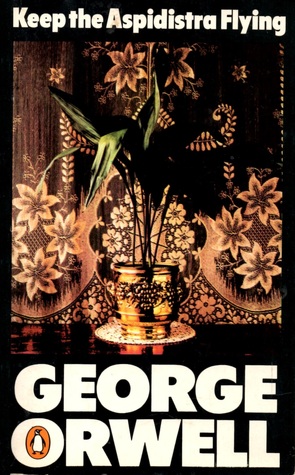
“Advertising is the rattling of a stick inside a swill-bucket.” So says George Orwell. I don’t know where I first saw the quote. Maybe on Twitter. Maybe on someone else’s blog. Wherever it was, I immediately snapped it up for myself and used it in defense of my decision not to monetize my blog. Isn’t that what they call it—monetize—kind of a euphemism for advertising? I nurse my peeves. I have my private theories. Concerns about unfettered consumption. Advertising as manipulation. Free exchange of ideas. Economies of gift. An aesthetic that belongs to everyone. Creative Commons. So I see the quote from George Orwell and think to myself: an authoritative figure whose writing cuts across literature and politics. What luck! I’ll lean on him to justify my choices.
Except that the quote doesn’t come from George Orwell; it comes from Gordon Comstock. Who is Gordon Comstock? you ask. Gordon Comstock is the main character of Keep The Aspidistra Flying, George Orwell’s third novel. Reading the quote in the context of the novel in which it appears, I find it impossible to attribute it to George Orwell. In fact, Orwell may be saying something quite different than what appears on the face of the quote. Here is the passage in which the swill-bucket comment appears:
The interesting thing about the New Albion was that it was so completely modern in spirit. There was hardly a soul in the firm who was not perfectly well aware that publicity—advertising—is the dirtiest ramp that capitalism has yet produced. In the red lead firm there had still lingered certain notions of commercial honour and usefulness. But such things would have been laughed at in the New Albion. Most of the employees were the hard-boiled, Americanized, go-getting type to whom nothing in the world is sacred, except money. They had their cynical code worked out. The public are swine; advertising is the rattling of a stick inside a swill-bucket. And yet beneath their cynicism there was the final naivete, the blind worship of the money-god. Gordon studied them unobtrusively. As before, he did his work passably well and his fellow-employees looked down on him. Nothing had changed in his inner mind. He still despised and repudiated the money-code. Somehow, sooner or later, he was going to escape from it; even now, after his first fiasco, he still plotted to escape. He was IN the money world, but not OF it.
The first thing to note is that the quote is an instance of free indirect speech, a narrative strategy that James Wood elucidates in How Fiction Works. It’s the literary equivalent of a tromp l’oeil. It surreptitiously draws us into the character’s consciousness while tricking us into believing that we are still reading the narrator’s voice. But even if this trick hadn’t happened, it would still be difficult to argue that Orwell and the narrator share the same mind.
The second thing to note is how the quote fits into the larger novel. Keep The Aspidistra Flying tells the story of an impoverished poet, Gordon Comstock, who lives in London between the two world wars. While nations threaten to make war on one another, Comstock vows to wage a private war against money. Hence the swill-bucket comment. With his war on money, Gordon reminds me of many young idealists I met at the Toronto Occupy demonstrations.
Gordon Comstock has a dead-end job as a clerk in a book shop that earns him £2 a week, a sister who loans him money to make ends meet, and a girlfriend who loves him in spite of himself. There is also a friend named Ravelston, upper class with an income of £2,000 a year who slums it on £800 a year and runs a socialist literary magazine called the Antichrist. The awkward encounters between Comstock and Ravelston reveal all sorts of insights into matters of money, class, and education. Everything goes to shit for Comstock when he sells a poem to an American journal and finds himself with £10 in his pocket. He hasn’t a clue what to do with money now that he has some. He takes his girlfriend and Ravelston to a restaurant he can’t afford, goes on a drunk, drags Ravelston to a whorehouse, and wakes up the next morning in a holding cell. He sinks and sinks, resisting a standing job offer at the New Albion, an advertising agency, all for the sake of his principles.
Orwell is subtle enough not to tell the reader what to think. Instead, we must observe for ourselves what Comstock’s situation reveals and draw our own conclusions. Comstock adheres to a rigid code, his money-code, and it threatens to destroy him. It is as destructive as the capitalism he rails against. The problem, it seems, is not money or not-money, or socialism or capitalism or any other ism, but a blind and unyielding adherence to principle.
Living your life—call it doing ethics if you like—is not about living in accordance with a strict code. You’re only ever doing ethics when you work to reconcile yourself to your necessary departures from a strict code. Comstock gets his girlfriend pregnant and that changes everything. It forces him to look beyond the narcissism of a principled life to the conflicting concerns of competing needs.
I return to the quote—advertising is the rattling of a stick inside a swill-bucket—and I agree with the statement (as I believe Orwell probably did, too), but it is far from the last word on the matter. I don’t think I’ll be quoting it anymore, except maybe as a conversation-starter.